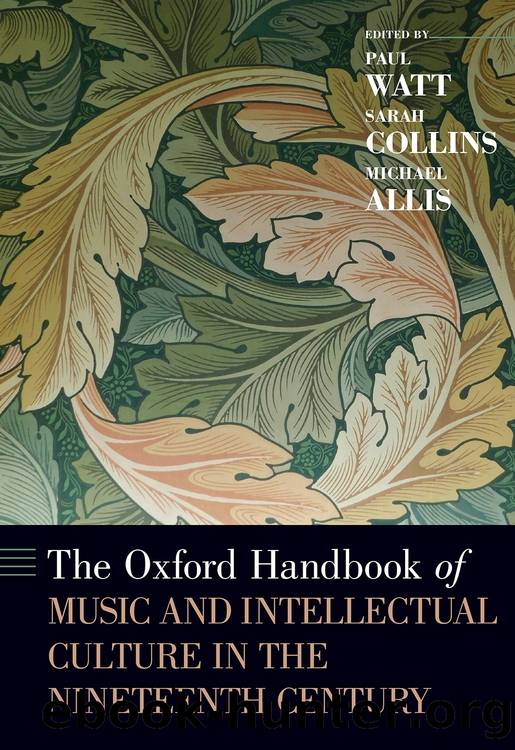The Oxford Handbook of Music and Intellectual Culture in the Nineteenth Century by Paul Watt & Sarah Collins & Michael Allis

Author:Paul Watt & Sarah Collins & Michael Allis [Watt, Paul & Collins, Sarah & Allis, Michael]
Language: eng
Format: epub
ISBN: 9780197500682
Publisher: OxfordUP
Published: 2020-07-09T00:00:00+00:00
Universities
Broadly speaking, the evolution of university education in the nineteenth century is characterized by increasing secularization and specialization. Two principal models emerged. The first, based in France, concentrated on organizing universities around specialist disciplinary colleges that offered strictly controlled curricula, an approach that had emerged out of the tabula rasa of the Revolution and its associated social and administrative reforms. The second, based in the German States, was in part a reaction to Napoleonâs rise to military and political dominance and the French occupation of Prussia after the Battle of Jena in October 1806. It argued that universities should be concerned above all with the pursuit of knowledge through research (Rüegg 2004, 5) and was developed and promoted chiefly by Wilhelm von Humboldt (1767â1835). Both models ensured that the university was to play a central role in the propagation of the modern nation-state; university qualifications became a passport for entry into the higher ranks of state bureaucracies. The dominance of particular languages of instruction in these universities also had the effect of making speakers of more local or minority languages more self-conscious about their own cultural differences within these states and helped embolden nationalist movements to explore what the political consequences of such differences might be.
Of particular significance for musicâs ongoing place within the university was Humboldtâs belief that the pursuit of empirical forms of knowledge should be balanced by more subjective and idealistic forms of inquiry. In a letter to Schiller of February 13, 1796, he argued that all knowledge dealt with either âreal objects or ideas, either with the conditional or unconditional,â and set out to devise an organization of educational departments around this division:
[1] Technical sciences and arts which deal with the real objects of experience for a definite and conditional purpose
[2] Speculative sciences which deal with all ideas situated outside experience. â¦
âHowever the conditional should be dealt with according to the rules of the unconditional, that is, according to an ideal. This ideal is either an ideal of intuitive knowledge or phantasy, or of perception or reason. And thus two new departments are formed:
[3] Aesthetic sciences, arts, that is dealing with real objects according to phantasy, intuition
[4] Teleological sciences, which deal with real objects according to the ideal of reason, of perfection.â(Roberts 2009, 38â39)
Underlying such an inclusive vision was his belief that such a fully rounded educational system would lead not only to an increase in knowledge but also to a better society.
The university that Humboldt founded in Berlin in 1810 soon became a world-leading center for research across the sciences and humanities. In 1830, Adolf Bernhard Marx (1795â1866) was appointed professor of music thereâthe first such appointment in any German universityâgiving lectures not only on the theory of musical composition but also on the purpose and method of musical education. âThe primary object of musical education and musical instruction,â he later argued, âis to promote the cultivation of the art. â¦But the artist and the teacher of art, as well as the amateur, belong to
Download
This site does not store any files on its server. We only index and link to content provided by other sites. Please contact the content providers to delete copyright contents if any and email us, we'll remove relevant links or contents immediately.
Aircraft Design of WWII: A Sketchbook by Lockheed Aircraft Corporation(32286)
The Great Music City by Andrea Baker(31917)
Call Me by Your Name by André Aciman(20499)
The Secret History by Donna Tartt(19053)
The Art of Boudoir Photography: How to Create Stunning Photographs of Women by Christa Meola(18614)
Shoot Sexy by Ryan Armbrust(17720)
Plagued by Fire by Paul Hendrickson(17405)
Portrait Mastery in Black & White: Learn the Signature Style of a Legendary Photographer by Tim Kelly(16996)
Adobe Camera Raw For Digital Photographers Only by Rob Sheppard(16969)
Photographically Speaking: A Deeper Look at Creating Stronger Images (Eva Spring's Library) by David duChemin(16683)
Ready Player One by Cline Ernest(14644)
Pimp by Iceberg Slim(14488)
Bombshells: Glamour Girls of a Lifetime by Sullivan Steve(14057)
The Goal (Off-Campus #4) by Elle Kennedy(13657)
Art Nude Photography Explained: How to Photograph and Understand Great Art Nude Images by Simon Walden(13032)
Kathy Andrews Collection by Kathy Andrews(11812)
The Priory of the Orange Tree by Samantha Shannon(9066)
The remains of the day by Kazuo Ishiguro(8977)
Thirteen Reasons Why by Jay Asher(8893)
